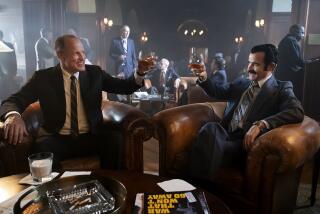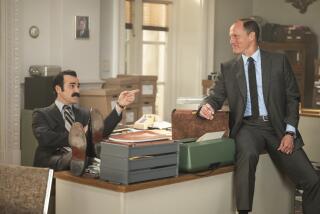Both Sides of the Law
- Share via
Former Watergate investigator Fred Dalton Thompson, 46, made his unexpected debut as an actor in 1985 when events in his own life became the subject of a feature film.
Thompson represented Marie Ragghianti in a Tennessee case involving official corruption. The verdict: The then-governor of Tennessee went to jail; the story became the feature film “Marie,” starring Sissy Spacek, and Thompson launched his performing career portraying himself when “Marie” producers tapped him to portray Spacek’s lawyer.
Although Thompson maintains his law practice in Nashville, his performing career did not end with “Marie”--the role led to a series of what Thompson calls “your typical white-collar, stuffed-shirt kinds of parts” including small roles in the recent TV movie “Unholy Matrimony” and the current feature film “Feds,” starring Rebecca De Mornay.
But Thompson is getting his chance to break out of the stuffed-shirt mode in the CBS crime series “Wiseguy.” The 10 p.m. Wednesday show brings in a new villain every few weeks, and it’s Thompson’s turn--he debuted last week as Knox Pooley, leader of a white supremacist group. Thompson will continue as Pooley for two more weeks.
He says he’s making the transition from good guy to bad guy “the hard way.” “Everybody likes the idea of playing a mob chieftain or something like that, but this guy is a con man, a rabble-rouser of the worst sort, a bad guy in the truest sense of the word,” Thompson says. “But, having said that, it offers the opportunity to do a lot of different things.” Thompson’s favorite story of corruption remains Watergate, which he viewed from a ringside seat as minority counsel to the Watergate Committee.
“The fact that certain individuals would violate the public trust at certain times in history should not be a disillusioning thing,” he says thoughtfully. “People have to understand that this happened and will probably happen again.
“The other side of the story is that in this country we have a system of checks and balances and a free press that can cope with these things. We are unique in that regard.”
More to Read
Only good movies
Get the Indie Focus newsletter, Mark Olsen's weekly guide to the world of cinema.
You may occasionally receive promotional content from the Los Angeles Times.








